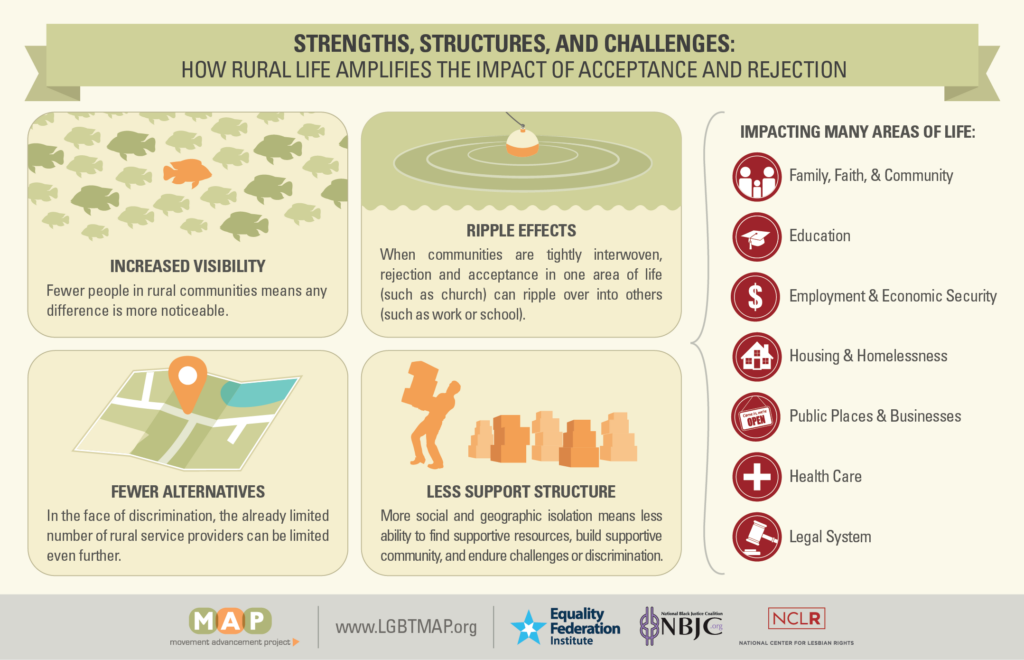According to a 2019 report, 3 to 4 million LGBTQ+ (lesbian, gay, bisexual, trans, queer) Americans, including many BIPOC Americans, live in rural communities, accounting for 15-20% of the total LGBTQ+ population. LGBTQ+ people live in rural regions for the same reasons as anyone does – whether to be near family or homeland, to enjoy natural beauty or a slower pace – and many have found or built strong and caring communities. But many other LGBTQ+ rural residents experience discrimination, fewer legal protections, and less social support and political power than their urban and/or non-LGBTQ+ counterparts.
In the last year, of course, anti-LGBTQ+ rhetoric and policy has become a tool of the extremist right, particularly bills targeting trans people. In the 2023 legislative session, every state except Delaware introduced anti-trans bills – a total of 556 proposed bills, with 86 having passed. These bills target trans people in a staggering number of ways, including children’s and parental rights, medical care, schools, books, sports, and drag shows. Many other policies, like Florida’s so-called “Don’t Say Gay” law, have been proposed or passed to restrict teaching or talking about LGBTQ+ people, seemingly in an attempt to legislate them out of existence.
Across the country, these and other discriminatory laws are more common in rural states. Rural states have long been less likely to have key legal protections against LGBTQ+ discrimination in employment, housing, public accommodations, health care, adoption and foster care, and more. Now LGBTQ+ people living in rural states are more likely to face actively discriminatory laws as well.
With so many of these laws at the state level, state legislators, especially in rural states, have been on the front lines defending and supporting LGBTQ+ people this session. In Nebraska, Senators Machaela Cavanaugh, Megan Hunt, and others, filibustered every bill to come before the chamber in an effort to block a bill banning gender affirming care for trans kids. In Montana, Representative Zooey Zephyr, the state’s first transgender lawmaker, was censured by the legislature after she criticized a similar bill; Oklahoma Representative Mauree Turner, the first out nonbinary state legislator in U.S. history, spoke out against a similar bill in that state, particularly pointing to the barriers it would create for rural trans Oklahomans. Turner faced censure for a different reason, but called it the latest example of being ostracized for being nonbinary, Muslim, and Black.
Like these examples, state legislators play a vital role in standing with LGBTQ+ communities and pushing back against hateful and violent rhetoric. In today’s climate, it is key both to work directly with impacted communities and to build relationships with unlikely allies and supporters wherever possible. Broad-based grassroots organizing and the slow work of finding shared values and building trust, in both rural and urban communities, are what will turn the tide.

Image credit: Movement Advancement Project
In addition, specific policy priorities to support LGBTQ+ communities around your state include:
- Rejecting anti-LGBTQ+ bills, including those regulating use of bathrooms, sports participation, and health care and those allowing denial of services to LGBTQ+ individuals.
- Banning bans, as in Illinois, which just passed a law prohibiting book bans in public schools and libraries (2023 IL HB2789). The vast majority of books targeted for removal in schools and libraries across the country are about or are written by BIPOC or LGBTQ+ people. New Jersey has introduced a similar law (2023 NJ SB3907)
- Affirming and protecting individual rights to make decisions for themselves and their bodies in bathrooms, sports, and other services. Colorado legislators passed a law this year (2023 CO HB1057) requiring public buildings to have gender neutral restrooms. In Washington, 2023 WA SB5028 changed the process for name changes, allowing trans individuals to seal their birth/dead names from public records.
- Expanding and protecting the rights of individuals to access to gender-affirming care and protecting against gender-based discrimination, Colorado passed a bill that prohibited discrimination in health care services based on gender identity (2023 CO HB1218), and Maryland expanded Medicaid access for gender-affirming care (2023 MD SB460).
- Include sexual orientation and gender identity in state anti-discrimination laws and protections for LGBTQ+ youth and students. In New Mexico (2019 NM SB 288), legislators enacted a comprehensive anti-bullying law that provides protections for students against bullying based on sexual orientation and gender identity.
- Include sexual orientation and gender identity in hate crime law and ban the LGBTQ+ “panic” defense. Vermont (2021 VT HB 128) and Colorado (2020 CO HB 1307) have banned the LGBTQ+ “panic” defense.
- Ban “conversion therapy” for LGBTQ+ minors. Minnesota banned conversion therapy with 2023 MN HF16.
- Create cross-sector/agency entities to proactively advise on equitable policies for LGBTQ+ communities. Vermont (2021 VT HB 210) formed a Health Equity Advisory Commission, and Minnesota (2021 MN HF 1924) proposed a Council on LGBTQI Minnesotans.
For more on working on LGBTQ+ issues in rural communities, visit the Blueprint for Rural Policy Action in the States, and for specific support on communications, check out our new toolkit.

